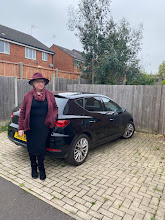Captivated by Corsica

The
Greeks called it Kalliste, ‘the beautiful one’. The epithet has stuck and
Corsica is known today as l’Ile de Beauté.
I
fell in love with this beguiling Mediterranean island more than a decade ago.
As the ferry approached, a looming shape detached itself from the haze and anticipation
rippled through the passengers. We rushed to the railings to get a first
glimpse of this chunk of granite that rises nine thousand feet above the sea at
its highest point. One long mountain range runs from north to south, like the
spine of a sleeping prehistoric monster.
Corsicans
claim that the aromatic scent of its hillside vegetation, the maquis, reaches well out to sea. Did I
catch that fragrance or was it just wishful thinking? It doesn’t matter. I was already
smitten.
We
disembarked at Ajaccio, a bustling place where traffic hurtles down narrow
streets that were not designed for it. The birthplace of Corsica’s most famous
son, Napoleon Bonaparte, it has an almost Italianate feel to it. Sitting at a
café on the Cours Napoléon, we watched the Corsicans stroll about during their
evening passeggiata. Many of the coastal towns are picturesque and colourful but they are havens for sun-seeking tourists. So we turned our backs on them in search of the real Corsica. We made for Corte, as we have done ever since, in the central mountains. Once the capital of Corsica’s only independent republic in the 18th century, the town now has a faded grandeur and some of the elegant townhouses are in a state of decay.
The island is noted for its majestic scenery. The switchback roads snake into the mountains with sheer drops on one side. Often, they are wide enough for only one vehicle. They are not for the faint-hearted, especially as Corsican drivers aren’t noted for their prudence. Scrawny cows that graze freely on the mountainside amble along the roads, presenting an extra hazard.
Corsica is much more than a scenic place to spend a holiday. It also has a fascinating history and culture, deriving from its strategic position in the Mediterranean and its island customs. It has been fought over, won and lost countless times over the centuries. Periodic but badly-organised rebellions failed to dislodge its conquerors.
Despite their dislike of foreign rulers, Corsicans have never been able to agree among themselves for long. Clan and family rivalries and intrigues are the foundation of Corsican society. The themes of honour, murder and vendetta run like a bloody fault line through the island’s history.
All this makes Corsica an ideal place to set stories – and some of its real-life tales are the stuff of novels. As luck would have it, during one visit we ventured into Cap Corse, the finger-shaped peninsula at the northern tip of the island. In a B&B at Nonza, overlooking the sea, I saw the love letters that inspired my novel. The owners had found them walled up in the attic when they restored the house. What better gift for a novelist?
So, Vanessa, can you tell us something about yourself and your career so far?
I’ve lived in southwest France since 1997 and work as a freelance writer. I am passionate about French and Corsican history and culture, which provide inspiration for much of my fiction. My debut novel, The House at Zaronza, is set in early 20th-century Corsica and at the Western Front during World War I. A sequel set in World War II and another novel set in 18th-century Corsica are in the pipeline. I also write short stories.
How did you incorporate your love of Corsica into your writing?
The House at Zaronza is set in early 20th-century Corsica and at the Western Front during the First World War. It follows the fortunes of Maria Orsini, a young woman from a bourgeois family, who lives in a Corsican village with her parents. She and the village schoolteacher fall in love but have to carry on their relationship in secret, since her parents would disapprove. Maria’s parents have other plans for her future and she sees her dreams crumble. The novel follows her story up to and beyond World War I, when she becomes a nurse at the Front. This is a novel about love, loss and reconciliation in a strict patriarchal society, whose values are challenged as the world changes.
Sounds wonderful. How do we buy it and find out more about yourself?
House at Zaronza universal buy link: http://getbook.at/Zaronza
France blog: http://vanessafrance.wordpress.com
Writing website: http://vanessacouchmanwriter.wordpress.com
Amazon author page: http://www.amazon.co.uk/Vanessa-Couchman/e/B00LQM4T9O/ref=ntt_athr_dp_pel_1
Facebook page: https://www.facebook.com/houseatzaronza.vanessacouchman
Twitter: @Vanessainfrance
Thanks Vanessa for giving us a glimpse of your writing!





















1 comment:
Thanks for hosting me on your blog, Olga.
Post a Comment